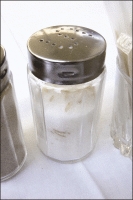It is well known that sodium plays a role in developing high blood pressure (hypertension) and that high salt at an early age may enhance our propensity to high blood pressure in certain populations as we age. It is the sodium part of table salt that is significant. In an earlier blog on sugar, we mentioned that sugar occurs naturally in certain foods. The same is true for sodium. One of the ways we can lower salt intake is to simply cook with less salt and not salt the food once it gets put on our plates. However, about 75% of our dietary salt comes from processed foods that contain the mineral before we even prepare it. A good example is the tomato. A fresh tomato naturally has 14 mg. of sodium; a cup of canned tomato soup has 932 mg. of sodium per cup (depending on manufacturer). Another example: 3 ounces of fresh tuna has 50 mg. sodium and the same amount of canned tuna has 384 mg. sodium. Part of the challenge is to convince policy makers and the public at large that prevention in the long run is much cheaper than the treatment of heart diseases and stroke.
According to the authors cited above, a national effort to reduce daily sodium intake by 1200 mg. could annually reduce the number of new cases of coronary heart disease by 60,000-120,000 and there also would be significant reductions in new cases of stroke and heart attack. Sound like a simple fix? This would involve major changes in the food industry, our lifestyles and our cooking patterns. While people already impacted by these chronic health conditions may adapt, would people who are currently healthy be inclined to pass up a piece of grandma's apple pie for a fresh picked apple?

 A recent article by Appel and Anderson in the
A recent article by Appel and Anderson in the
Comments